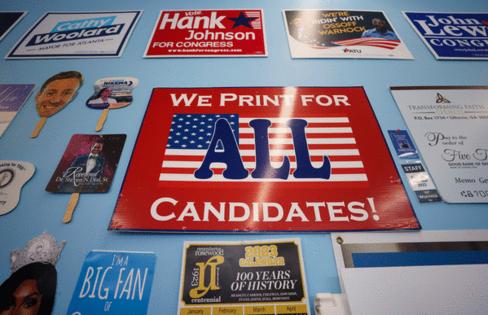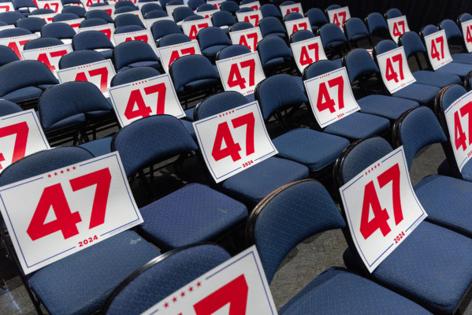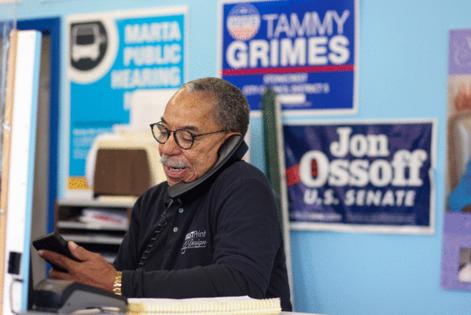How Trump and Harris campaigns could be fueling Georgia's economy this election
Published in Political News
ATLANTA — Georgia’s star turn as a swing state in the presidential election did more than just boost its national political clout. It also guarantees a jolt of economic activity every four years from the overflowing coffers of major presidential campaigns and the outside groups that support them.
Spending in presidential elections increased four and a half times during first two decades of the 21st Century, reaching $6.3 billion during the 2020 cycle, according to nonprofit watchdog OpenSecrets. But the money is not spent equally, as campaigns focus the bulk of their resources on states they must win to capture the White House.
Until recently, that did not include Georgia, a state that had been firmly in Republican hands. But the 2020 election changed that, as Georgia voters narrowly chose President Joe Biden over former President Donald Trump and sent two Democrats to the U.S. Senate.
The result has been a barrage of rallies, town halls, news conferences and staffing hires this year as both major party presidential campaigns compete for every vote in Georgia.
“It’s a windfall. It’s simply amazing,” said Don Jackson, owner of Best Print and Design in Decatur, a print shop that focuses on political signs for Democrats. “Every time there is a rally, the phone rings.”
The phone rang this summer shortly after Vice President Kalama Harris replaced Biden at the top of the Democratic ticket. Harris was coming to Atlanta for a major rally, and her campaign wanted 5,000 signs as fast as he could make them.
Jackson said he usually triples his business during presidential election years, but he noted the campaigns are spending more this year than they have in the past. So far, he’s received more than $43,000 from the Kamala Harris campaign, according to campaign finance reports. He’s had to hire a few more people to handle the workload — which also includes lots of orders from outside groups. Jackson said he printed 100,000 small cards with key early voting dates on them for groups to hand out to potential voters.
“There’s a line at the door on Friday because everybody is picking up on Friday and they are canvassing on Saturday,” he said.
The Trump campaign has spent thousands of dollars in Georgia to rent facilities for rallies and rent equipment. They spent more than $60,000 on one Georgia photography company, which included taking photos and travel expenses.
State governments have long known about the economic benefits of presidential elections. It’s why lots of states have tried to move their presidential primaries earlier and earlier to capitalize on the attention. And it’s why the traditional early voting states of Iowa and New Hampshire have fiercely fought to protect their spots on the calendar.
Democrats have experimented with upending their primary calendar to give states with more diverse electorates a bigger say in the party nominating process. A plan last year would have moved Georgia’s primary earlier in the year, but wasn’t approved by the Republicans in charge of Georgia’s state government.
A bonanza for TV stations
The most obvious sign of campaign spending is on television with the incessant parade of political ads that populate timeouts of college football games. The presidential campaigns and their allies have bought nearly $158 million worth of ads on local TV stations, with Atlanta’s ABC affiliate WSB-TV accounting for 29% of that spending, according to data from the tracking firm AdImpact.
“The biggest winners of any election in this kind of modern era of media spending are local TV stations,” said Jacob Hawkins, a Republican political consultant who is president of digital for LINK Public Affairs.
Just how that money has impacted Georgia’s economy is difficult to measure. The bonanza of political TV ads can sometimes push out other local advertisers, like car dealers, thus offsetting some of that spending’s impact.
Overall presidential campaign spending is down slightly from 2020. That’s mostly because the Democratic primary that year was much more expensive with multiple candidates spending big money, including former New York Mayor Michael Bloomberg spending more than $1 billion of his own money, according to Brendan Glavin, deputy research director at OpenSecrets.
But the race isn’t over yet and both campaigns and their allies continue to raise — and spend — hundreds of millions of dollars nationally.
Tracking total spending on the presidential race in Georgia is tricky because It’s difficult to know where the campaigns are spending their money based on their financial disclosures. For example, the Harris campaign has paid a media-buying firm with a Georgia address more than $227 million to purchase TV ads — not all of them in Georgia.
“From a campaign disclosure standpoint, you can’t really tell where the money is being spent,” Glavin said.
Still, over the entire four year cycle, the official presidential campaigns for the two major party nominees have reported expenditures at least $4 million in Georgia on things like travel, lodging, food, printing and equipment rentals. That doesn’t include money from other groups.
‘They have to eat somewhere’
There are scant published academic studies investigating the impact of campaign spending, but the few that do exist agree it can boost local economies.
One study published this summer by researchers at Stanford, the University of Toronto and Columbia Business School, estimated that wages and jobs increased by 3% in the first six years after the U.S. Supreme Court lifted many restrictions on campaign spending by outside groups.
That effect can be higher for presidential primaries that feature short bursts of intense campaigning in small spaces. A study published in 2016 that studied presidential primaries between 1974 and 2009 found a 25% increase in per capita earnings during a three-month period because of the “multiplier effect.”
“All these staffers coming in, they have to eat somewhere,” said Carly Urban, professor of economics at Montana State University and a co-author of the study. “When someone is spending more at a restaurant, then that waitress who was serving those people gets a bigger tip, and she tips her hairdresser more, and you use this continuation multiplier throughout the state.”
This multiplier effect isn’t as intense in places where everyone knows their business will increase — like when a city hosts a Super Bowl with a few years advance notice. But in Georgia’s case, it’s celebrity swing state status is still new enough that is likely experiencing “one of these mega event booms to spending and, in turn, earnings,” Urban said.
And sometimes the boom isn’t for everyone. Over the summer, Rocky Jones hosted an event for the Trump campaign at his Atlanta barber shop. What he thought would be a small gathering of Black business owners turned into a big media event with lots of attention for Trump.
Jones told 11Alive news that didn’t go over well with some of his customers, costing him some business.
“We definitely got some calls, some backlash,” he said.
_____
(Staff Writer Phoebe Quinton contributed to thus story.)
_____
©2024 The Atlanta Journal-Constitution. Visit at ajc.com. Distributed by Tribune Content Agency, LLC.

































































Comments